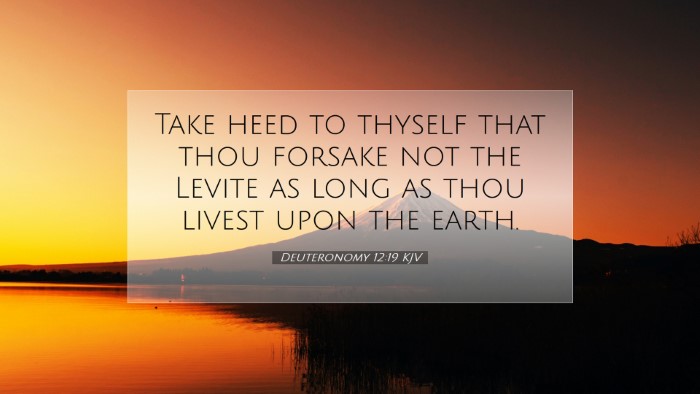Commentary on Deuteronomy 12:19
Bible Verse: "Take heed to yourself that you do not forsake the Levite as long as you live in your land." (Deuteronomy 12:19, NKJV)
Introduction
This verse addresses the treatment of the Levites, emphasizing their important role within the Israelite community. The Levites were set apart for service to God and the Tabernacle, and their sustenance relied on the generosity of the other tribes. Understanding Deuteronomy 12:19 requires an exploration of the cultural and religious context of ancient Israel, as well as the implications of this commandment for the community's spiritual health and institutional integrity.
Contextual Background
The Book of Deuteronomy serves as a covenant renewal document for Israel before they enter the Promised Land. Moses, as the leader, reiterates the laws and statutes that the people of Israel must follow. Within this framework, special instructions regarding the Levites highlight their role as mediators between God and the people.
The Role of the Levites
According to Albert Barnes, the Levites were chosen by God to perform sacred duties and to assist the priests in their functions (Numbers 3:6-10). They did not receive a territorial inheritance like the other tribes, which made them reliant on the offerings and contributions from the Israelites. The Levites were responsible for teaching the law and leading worship, making their presence integral to the spiritual life of the nation.
Analysis of Deuteronomy 12:19
Exhortation to "Take Heed"
The phrase "Take heed to yourself" reflects a call to personal responsibility and community accountability. Matthew Henry highlights that this warning is not merely about avoiding neglect of the Levites; it presents an attitude of care and respect. Ensuring the Levites are not forsaken reinforces their significance in maintaining the religious observance and order within Israel.
The Warning Against Forsaking the Levites
To "forsake the Levite" indicates a potential spiritual decline which can manifest in various ways. Adam Clarke notes that forsaking those who are dedicated to a holy calling could lead to a detachment from God's prescribed order and worship. It serves as a warning against apathy towards spiritual leaders and mediators who guide the congregation in faithfulness.
The Implication of Living in the Land
The command is situated within the context of living in the land, which symbolizes a relationship with God rooted in covenantal promises. As Clarke elaborates, Israel's possession of the Promised Land was conditioned by their faithfulness to God and one another. Neglecting the Levite would suggest a broader indifference to the covenant, inviting consequences that could affect the entire community.
Theological Insights
The Levite as a Symbol of Ministry
The Levites can be seen as a type of ministerial role in the Church today. The New Testament parallels this relationship, calling upon believers to honor those who labor in spiritual leadership (1 Thessalonians 5:12-13). Just as the Levites had pastoral duties and were integral to the worship of God, so too are modern-day ministers called to shepherd their flocks and keep the faith alive.
The Importance of Community Support
This verse invites reflection on how communities support their ministers. The body of Christ flourishes when congregants actively engage with and uphold their spiritual leaders. The act of honoring those devoted to spiritual work fosters a healthy church environment, where worship and teaching can thrive.
Practical Application
For pastors, students, theologians, and Bible scholars, Deuteronomy 12:19 provides several actionable insights:
- Encourage Congregational Involvement: Pastors should teach their congregation about the importance of supporting their leaders through prayer, resources, and encouragement.
- Model Participation: Leaders must demonstrate the value of serving and acknowledging the contributions of all members within a faith community.
- Historical Reflection: Scholars can study the role of the Levites as a way to deepen their understanding of leadership dynamics in both the Old and New Testaments.
- Personal Accountability: Members of the church should be mindful of their responsibilities to support one another in faith, especially those called to lead.
Conclusion
Deuteronomy 12:19 serves as a timeless reminder of the interdependence of the faithful community. In honoring those who serve spiritual roles, believers cultivate a community that reflects God's design for worship and service. By taking heed to not forsake the Levites, the Israelites were instructed to cherish and prioritize the leadership that guides them in their covenant relationship with God. In today's context, such commitment fosters a vibrant and purposeful community of faith.


